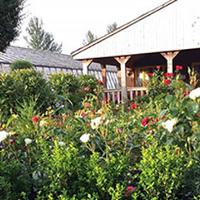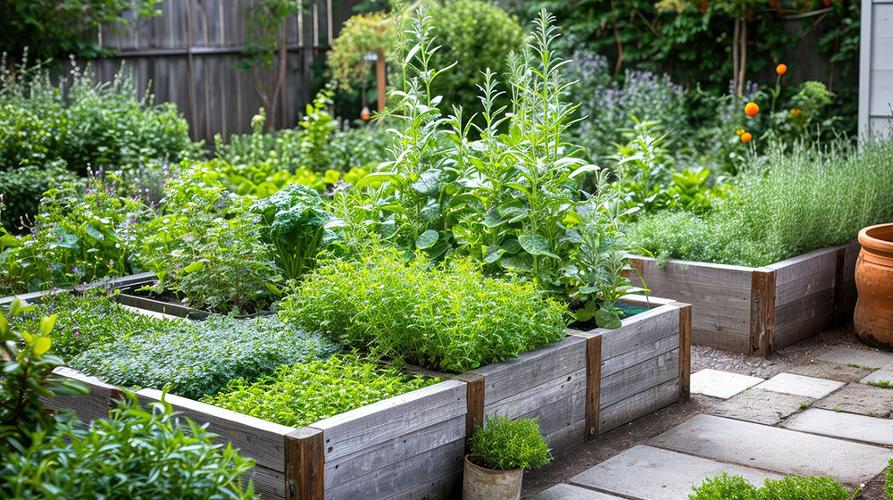How to grow herbs for the kitchen
There's nothing like the flavour and fragrance of freshly picked herbs from your own garden or windowsill. Whether you're cooking a Sunday roast, tossing a salad, or brewing a cup of mint tea, homegrown herbs bring an unbeatable freshness to your kitchen.
The good news? Most herbs are easy to grow, and many will thrive in the UK climate with just a little planning. Here's everything you need to know about growing herbs at home, from the best conditions for different herbs to tips on harvesting and care.
Why Grow Your Own Herbs?
- Freshness: Pick exactly what you need, when you need it.
- Cost-effective: No more buying supermarket herbs that wilt in days.
- Compact: Most herbs grow happily in pots, perfect for patios, balconies, or windowsills.
- Aromatics: Many herbs double as natural air fresheners and attract pollinators to your garden.
Where to Grow Herbs
Herbs can grow in beds, borders, pots, or even on a sunny windowsill. The key is to match the herb to the growing conditions.
Sun-Loving Mediterranean Herbs
These herbs love heat, sun, and well-drained soil, just like their native habitats.
- Rosemary
- Thyme
- Oregano
- Sage
- Lavender (culinary varieties)
Soil: Free-draining, ideally sandy or gritty. If planting in heavy clay soil, improve drainage with horticultural grit or compost.
Light: Full sun – at least 6 hours of direct light per day.
Location tip: These herbs do brilliantly in containers placed on a sunny patio or by a south-facing wall.
Moisture-Loving, Cooler-Climate Herbs
These are better suited to typical British weather, and don't mind a bit more shade or moisture.
- Mint
- Parsley
- Chives
- Coriander
- Tarragon (French)
- Lovage
- Chervil
Soil: Moist, fertile, and well-drained. Richer loam or compost-based soil works well.
Light: Partial shade to full sun, depending on the herb. Mint, chervil and parsley tolerate shadier spots.
Location tip: Raised beds or pots near the kitchen door make for easy harvesting. Keep mint in containers, its roots are invasive.
Growing Herbs from Seed vs Plants
From seed: Cost-effective and rewarding. Great for annuals like basil and coriander.
From young plants: Faster results, easier for beginners. Best for perennials like rosemary and thyme.
Most herbs can be sown in spring (March–May) after the last frost. Mediterranean herbs like basil are frost-sensitive, so keep them indoors or in a greenhouse until warm weather arrives.
Essential Growing Tips
Drainage matters: Herbs hate soggy roots. Ensure containers have drainage holes and use a well-draining compost mix.
Don't overfeed: Too much fertiliser can reduce flavour. Feed lightly or not at all for stronger-tasting herbs.
Trim regularly: Harvest little and often to encourage bushy, healthy growth.
Watch the weather: In cold snaps, bring pots indoors or protect them with fleece.
Best Herbs for UK Kitchens
Here's a handy list of herbs suited to UK conditions, including their preferred environment:
| Herb | Soil Type | Light Level | Notes |
| Basil | Light, fertile | Full sun | Tender - grow indoors or in summer |
| Rosemary | Free-draining, poor | Full sun | Hardy and low maintenance |
| Mint | Moist, fertile | Partial shade | Keep contained, very vigorous |
| Parsley | Moist, fertile | Partial sun | Biennial, treat as annual |
| Thyme | Sandy, poor | Full sun | Tough and drought-tolerant |
| Oregano | Well-drained | Full sun | Thrives in dry conditions |
| Coriander | Rich, moist | Partial sun | Quick to bolt - sow in succession |
| Chives | Moist, fertile | Partial sun | Hardy and easy to grow |
| Sage | Free-draining | Full sun | Evergreen and great for meat dishes |
Harvesting and Storing
- Pick in the morning after the dew dries but before the sun is strong.
- Use sharp scissors to avoid damaging stems.
- Freeze or dry any excess for use in winter cooking.
Final Thoughts
Herbs are the perfect introduction to edible gardening, easy to grow, forgiving, and incredibly rewarding. Whether you have a sprawling garden or just a few pots on the windowsill, there's a herb for every space and taste.
Visit Gardening World Limited for fresh herb plants, seeds, compost, and containers. Our team is always on hand to help you get the most from your herb garden, no matter your experience level.




